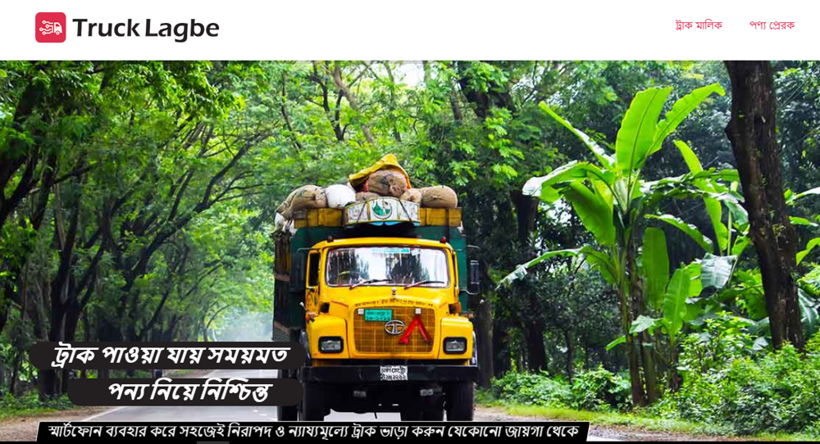
Truck Lagbe, the startup that connects truck owners and shippers, has launched a new version of its app and opened up its platform to both the shipper and truck owners. The way the platform works now is simple: if you need a truck, you go and create a post asking for quotation from truck owners and then truck owners bid for the deal and at the end of the day, you choose the one you find suitable for you. It has also announced that it would not charge commission from the truck owners or the shippers anymore. From now on, the platform will be free for both parties, truck owners and shippers, until further notice.
These are consequential moves on the part of Truck Lagbe in more than one way. The immediate impact of the announcement was a sharp rise in the number of users and usage from the existing users. That part makes sense. But there are more to it than what meets the eye. In this piece, I plan to dig a little deeper into Truck Lagbe’s business and the growing tendencies among startups to build aggregators.
First an intro of Truck Lagbe. Started in 2017, Truck Lagbe is an online platform that connects truck owners/drivers and shippers for free. From How Truck Lagbe Is Taking On An Age-old Transportation Industry: An Interview With Anayet Rashid, Founder and CEO, Truck Lagbe:
“We call ourselves Truck Lagbe Network because we work as an aggregator platform where the drivers/owners and shippers can connect and do business swiftly.” ‘Aggregator’ is the key word here.
When we last spoke with Truck Lagbe, it had around 8,000 vehicles on its platform and was managing 50-60 trips per day and seeing a growing engagement in the platform. When it opened up the platform last month, the company said, it has seen an immediate effect in the user growth and engagement. In the beginning, it used to charge a small fee to truck owners/drivers. However, with the launch of the new version of its app, it has dropped the charge. The platform is free for all now. As I mentioned earlier, this decision is likely to change the trajectory of the Truck Lagbe business and how the platform monetizes itself in the future.
Truck Lagbe considers itself as an aggregator. This is one of the reasons why its decision to make the platform open is an important move and demands more attention. To understand how aggregators are different from a more traditional business model, this excerpt from a previous analysis on Shohoz could help. From Shohoz Makes A Necessary Move And Shohoz’s Search For Moat:
“Shohoz in a sense is an aggregator and its power lies in its ability to build and control relationship with customers and thus distribution. Customers go to Shohoz because they can buy any ticket from one place and service providers rely on it because it controls customer interaction. That’s the name of the game.
And this is exactly why it is absolutely necessary for Shohoz to get into ride-hailing for its long-term sustainability. It is an existential question for the company.
Because when Shohoz’s business case lies in building and controlling customer interaction with the ticket sellers or service providers and disintermediating their own distribution channel replacing it with Shohoz website or app, ride-hailing services in Dhaka threaten this central proposition of Shohoz by building and controlling that same interaction with that same customer, meaning any ride-hailing business that offers ticketing or delivery service – and almost all of these ride-hailing services in Dhaka plans to get into ticketing today or tomorrow – disintermediates Shohoz destroying its core value proposition. Shohoz can’t allow that to happen. That’s why when Shohoz announced its ride-hailing, I was not surprised at all because its success in ride-hailing will save its ticketing business.
This is all about owning the interaction with the customers. None of the competitors here owns any of the services they offer, they merely control the interaction with the customers and that’s where power lies in an abundant environment which is the internet.”
For Truck Lagbe, truck owners, drivers, truck-related utility sellers, shippers and everyone else in the universe of truck-transportation are its potential customers. The core stake of getting there is owning the interaction with truck owners and drivers and shippers. Once this nod is done, the rest is bound to follow. And the real business of Truck Lagbe begins when they are done with this phase of their development.
Let’s go a little deeper. Apparently, what we see is that Truck Lagbe is a two-sided marketplace: truck owners and shippers. But if you pay a closer attention it is not that simple. The list of stakeholders is long. For clarity, there are owners, drivers of truck, and then there are shippers, and then over the time, service providers, utility and products sellers would also take interest in the platform and so on. The beauty of a platform is that you are essentially building an infrastructure at the beginning and then once the infrastructure is ready, you can decide how you want to take the benefits of it to the point it does not break. For Truck Lagbe, it is a two-sided marketplace but over the time, the company expects that it will be able to activate different parties in this two-sided transaction, starting from services to products to more, which is now only truck owners and shippers.
